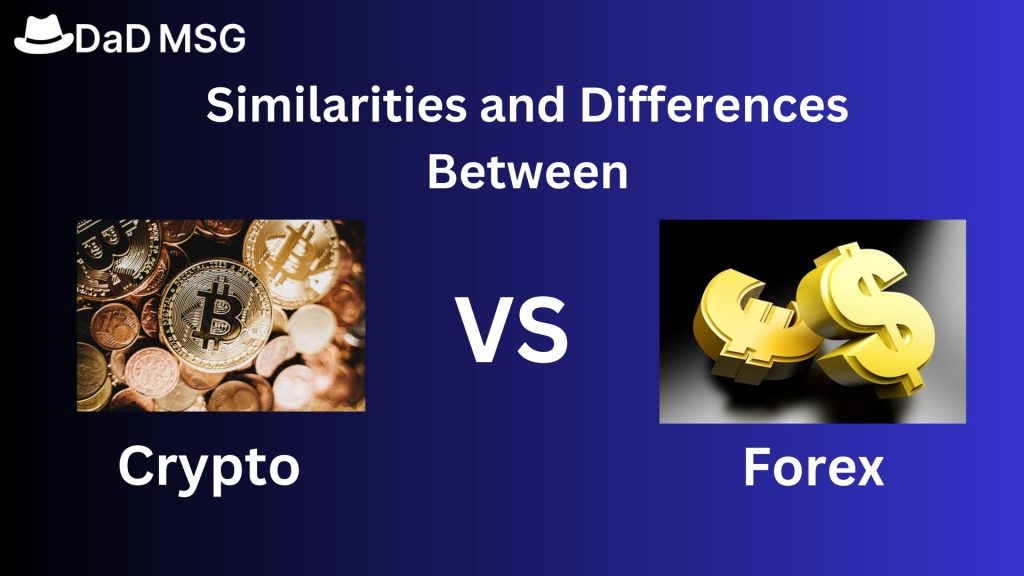Trading in cryptocurrencies and foreign exchange have grown in popularity as financial choices recently. They are both examples of speculative trading, in which currencies or digital assets are bought and sold with the intention of making a profit. While there are some similarities between the two, there are also significant differences. The parallels and contrasts between cryptocurrency and forex trading will be discussed in this article, along with which one may be more profitable or more suited for novices.
What is Forex and Crypto Trading?
Foreign exchange trading, usually referred to as forex trading, is the buying and selling of various currencies on a global market. With a daily trading volume of more than $5 trillion, the forex market is the biggest financial market in the entire globe. Profiting from changes in the exchange values of various currencies is the aim of forex trading.
Contrarily, cryptocurrency trading entails the purchase and sale of digital assets or cryptocurrencies like Bitcoin, Ethereum, or Litecoin. Because cryptocurrencies are decentralised, no government or financial institution has any control over them. With a current market capitalization of over $2 trillion, the cryptocurrency industry has experienced remarkable growth in recent years.
Cryptocurrency vs Forex Market
The forex and cryptocurrency markets are both decentralised, meaning no single entity has power over either one. The exchange rate between two currencies is controlled by supply and demand in the forex market, where currencies are traded in pairs. Prices on the cryptocurrency market are equally influenced by supply and demand, but because there is less regulation and a smaller market than for FX, there is frequently more volatility.
The degree of liquidity in the two markets is one of their main differences. The ability for traders to easily enter and exit positions makes the FX market the most liquid market in the entire globe. Despite its rapid growth, the cryptocurrency market still has less liquidity and can be more challenging to trade, especially for larger investors.
The trade hours are another distinction. While the cryptocurrency market is open 24/7, the forex market is open five days a week. As a result, cryptocurrency investors may need to keep a closer check on their money and be ready to act swiftly when the market shifts.
Forex vs Crypto which is more profitable?
Both forex and cryptocurrency trading have the potential to be lucrative, but the extent of success is influenced by a variety of elements, such as market conditions, trading approaches, and individual aptitude. Due to its size and degree of regulation, the FX market is typically regarded as being less dangerous than the cryptocurrency market. Due to the volatility of the bitcoin market, there are more chances for huge gains.
Both markets are high risk, thus before making an investment, traders should always conduct their own research and create a sound trading plan. Utilizing the right risk management strategies is also crucial if you want to reduce losses and increase profits.
Is Crypto or Forex better for beginners?
For beginners, due to its scale and degree of regulation, the FX market might be a preferable choice. The resources for study and research are more plentiful and the FX market is more established. Additionally, there are brokers and trading platforms that have more experience that can aid and direct novice traders.
While the cryptocurrency market is expanding quickly, it can also be more volatile and complex, which makes it harder for beginners to get started. The bitcoin industry is also less regulated, which may result in an increase in fraud and frauds.
However, newcomers can also succeed in the cryptocurrency market with the right training and a sound trading strategy. It’s crucial to start off with modest investments and gradually increase market exposure as you gain expertise and knowledge.
Read More:- Unlocking the Power of Hindi: The Best Hindi Language Datasets of 2023
Crypto Forex trading Platform
Both forex and cryptocurrency trading are offered on a wide range of trading platforms. The MetaTrader 4 and 5 platforms, cTrader, and TradingView are a few of the well-known forex trading platforms. These platforms give traders access to a variety of tools and resources, such as charting and technical analysis tools, real-time market data, and trade execution capabilities.
Popular platforms for trading cryptocurrencies include Coinbase, Binance, and Kraken. These platforms enable traders to buy, sell, and exchange cryptocurrencies as well as trade them against fiat money or other cryptocurrencies.
Given that there have been instances of fraud and scams in both the forex and cryptocurrency sectors, it is crucial to select a recognised and trustworthy trading platform. Traders should also be aware of any restrictions or requirements for opening and maintaining an account, as well as the fees and charges related to each platform.
Conclusion
In conclusion, speculative trading involves purchasing and selling currencies or digital assets in order to gain money. This is true of both forex trading and cryptocurrency trading. There are significant differences between the two markets, such as liquidity, volatility, and regulation, despite the fact that they are comparable in other ways, such as being decentralised and affected by supply and demand.
Both markets have the potential to be profitable, but the degree of profitability depends on the market, trading methods, and traders’ personal abilities. Due to its scale and degree of regulation, the forex market can be a better choice for newcomers, whilst the cryptocurrency market might be a better fit for seasoned traders or those looking for greater returns.
Whatever market is selected, it is critical for traders to create a sound trading strategy, employ effective risk management methods, and select a reputable and dependable trading platform. By keeping these things in mind, traders may successfully navigate the forex and cryptocurrency markets and take advantage of the opportunities these markets offer.




